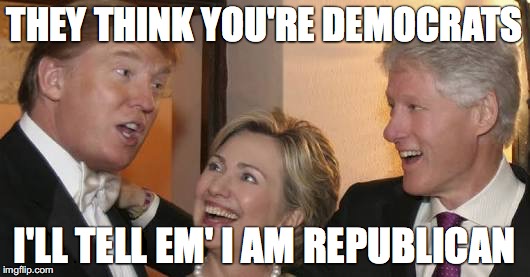Of course I had no choice left but for my "contact website" to link to: http://bfgalbraith.blogspot.com/2017/03/one-boy-at-time.html
I am into feminism, I think it is awesome. Please pass me some Oprah 2020, thank you very much. However I have a problem-from-hell with postmodernism. The opposite-of-knowledge is not knowledge, it is that simple. Postmodernism amounts to little more than intellectual laziness combined with wide-eyed rants about personal pet peeves.
But the left his hardly the owner of postmodern idiocy. What pomo typically looks like on the right is:
- Have a REALLY strong opinion, but bring NO evidence to support it, aside from 1st and 2nd hand anecdotes.
- When people say "hey hold on a second, what's this based on..." you then resort to one of two options:
- A) accuse them of being condescending elitists (almost exactly same thing as "The Patriarchy"), or
- B) tell them "why don't you do your own research", aka do NOT rely on outside sources, because you know, personal experience trumps all, just like with 3rd Wave pomo.
Example:
- You: "I think welfare recipients should be drug tested."
- Me: "don't you know that is a huge waste of tax payer money because drugs are expensive and welfare recipients are poor... and some of the conservative politicians pushing this line of thinking have conflicts of interest on this subject... here's a link to an article on the subject: https://www.forbes.com/sites/judystone/2015/02/17/the-sham-of-drug-testing-walker-scott-and-political-pandering/#15bd34e559be ."
- You: Now you can say "you so-called progressives are very condescending. You think you can win a common sense argument by linking to a politically biased news source? Sorry, but your so-called research doesn't trump common sense!"
- You: OR you can say "I had a friend on food stamps. While he was waiting in line, he saw people drive up in sports cars, who had gold watches on, who were dealing drugs and making huge money, and still applying for food stamps. I know him well, he wouldn't lie about this. And that's just one welfare office, imagine what could be going on in others. Why don't you go do your own research instead of just reading left biased media?"
But the fact is opinions are not equal to facts. "Cisheteropatriarchy" is an interesting word, but since postmodernists don't like to stick to specific definitions, it may as well mean "surgical penis enlargement" as my brother recently pointed out. And no, it's a huge waste of tax payer money to drug test welfare recipients, because dude, drugs are expensive.
Pomo-the-Pomo Example:
- You: "I think welfare recipients should be drug tested."
- Me: "No, we should drug test rich people instead. Most drug dealers are rich people."
- You: "But lots of people on welfare use drugs! We shouldn't have to pay for it!"
- Me: "Sorry my friend, but drugs are a moral evil and bad for all, rich and poor alike, and rich people have more money more often to buy drugs more often, drug test the 1%! Being rich doesn't make you right, something you should keep in mind before talking down to everyone."
- Me: OR I can say "My friend was at a party with rich people. Lots of coke. More drugs than she has seen at all the parties she's been at with poor people combined. An entire welfare office of food stamp recipients wouldn't be able to pay for the drugs it took to keep one of the debutantes at this party satisfied for the evening. Why don't you go do your own research instead of reading right-wing conspiracy all the time?"
My counter argument here is not rational, it's pomo. It is deconstructing the deconstruction. Pomo the pomo! Maybe we can get them to resort to using facts and actual substantial arguments that have meaning. Because unlike Yoga, postmodernism is a form of oppression:




.jpg)

